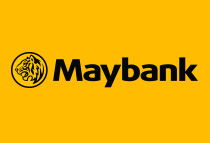1-300-88-6688 or +603-7844 3696 (overseas) any time, any day. That includes holidays.
Call 1-800-88-3231 or
+603-2072 1373 for credit cards and 1-300-88-6688 for ATM cards to report it immediately
Reach our internet banking fraud hotline at +603-5891 4744
GHC Intelligence & Operations Centre
Email: mbb_screening@maybank.com
Contact: +603 2074 7916
To conduct entrepreneurship training for 200 Persons With Disabilities
Maybank Foundation has extended its R.I.S.E (Reach Independence & Sustainable Entrepreneurship) Programme to Sabah, targeting to build the capabilities of 200 Persons with Disabilities (PWDs) in the State, through a structured training and mentoring programme.
The Foundation today launched the first part of its programme in Kota Kinabalu, which saw some 30 PWDs come together for a three-day Entrepreneurship & Financial Training session. This will be followed by a 3-6 month mentoring period where the participants will be trained, coached and mentored to develop their entrepreneurial skills designed to help them achieve higher income levels and improve their overall standard of living.
The programme was launched at the Sabah State Library in Kota Kinabalu recently by the CEO of Maybank Foundation, Shahril Azuar Jimin, who was accompanied by Maybank Regional Director for Sabah, Liew Kui Choi.
Speaking at the launch, Shahril said that R.I.S.E is one of the Foundation’s six flagship programmes under Maybank Group’s Community & Citizenship pillar. A pilot programme was carried out in the Klang valley in September 2014, reaching out to 280 participants from underprivileged households comprising PWDs, single mothers and marginalised persons.
“This pilot project was a huge success and exceeded our expectations as it resulted in an increase of 411.7% in average income per participant for the top 40% of our pioneer group of participants,” he explained. “It encouraged us to move into Phase 2 of the programme which was launched on 5 August 2015 where we expanded the scope to a total of 1,800 people in three countries namely Malaysia (1,400), Indonesia (200 as pilot), and Philippines (200 as pilot) of which 70% will comprise PWDs.”
Shahril said that the Foundation has so far trained more than 800 participants throughout Malaysia in Phase 2 and was excited to be in Sabah for its inaugural training session. “These 800 participants have shown good progress and we are confident that we can achieve similar success in Sabah,” he said.
Our commitment to supporting and empowering the disadvantaged, especially PWDs, is very much in line with Maybank’s mission of humanising financial services,” Shahril added.
“We believe that helping all segments of the community to gain financial independence
will ensure the overall prosperity and sustainability of society at large.”
Shahril said that the Foundation is working with various organisations in the State such as
Jabatan Kebajikan Masyarakat Negeri Sabah, Sabah Cheshire Home, Kompleks Pemulihan
OKU Kimanis Papar, Pusat Pemulihan Dalam Komuniti Kota Kinabalu and Bukit Harapan
Penampang to ensure that the R.I.S.E. programme reaches the appropriate recipients.
He added that concurrently with the running of Phase 2 of the programme in Malaysia, the
Foundation has also started its pilot programme in Indonesia. The first session was held
from 26- 28 April recently in Pondok Bambu, Jakarta which saw over 40 participants
including 32 wheelchair bound persons and seven PWDs with physical challenges. A second
session was held from 2-4 May 2016 at Dinas Sosial Gunung Sahari, Jakarta, and attended
by 32 participants comprising 3 wheelchair bound PWDs and 29 physically disabled
persons.
“We are planning to extend the training to the first batch of participants in the Philippines
in September 2016 as part of our commitment under Phase 2 of the R.I.S.E. programme,”
he said.
Maybank Foundation was set up in 2010 to implement Maybank’s corporate sustainability
programmes in Malaysia and throughout the region where it operates. It aims to assist
communities and support them through long-term partnerships, volunteer efforts and
targeted social investments. The Foundation’s approach goes beyond charitable giving,
and encompasses sustainable programmes with long-lasting impact.
The Foundation supports initiatives in six focus areas: Education, Community
Empowerment, Healthy Living, Environmental Diversity; Arts and Culture and Disaster
Relief. It identifies programmes that have the most tangible impact with long-term
results. Through strategic partnerships with stakeholders and NGOs, the Foundation strives
to enhance quality of life for all - especially the less fortunate - irrespective of race,
gender, or creed.
The R.I.S.E. programme, which is jointly organised with People System Consultancy and
run over three years until 2017, is one of the key regional Community Empowerment
initiatives of the Foundation.
 Maybank Islamic
Maybank Islamic  Investment Banking
Investment Banking Global Banking
Global Banking Business Banking
Business Banking SME Banking
SME Banking Asset Management
Asset Management Maybank Private
Maybank Private Maybank Premier
Maybank Premier Maybank Privilege
Maybank Privilege
 Customer Service
Customer Service